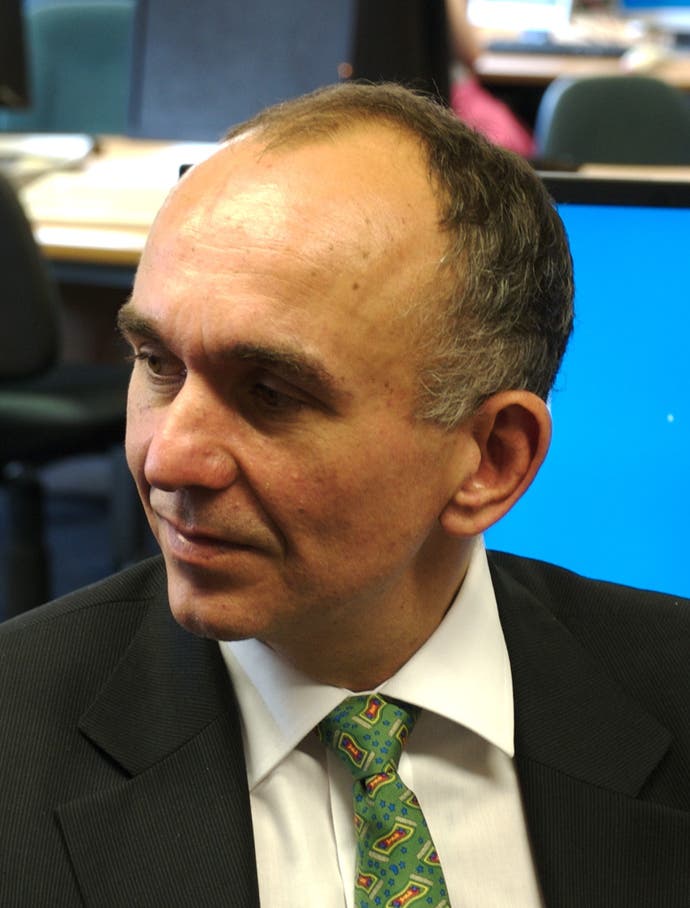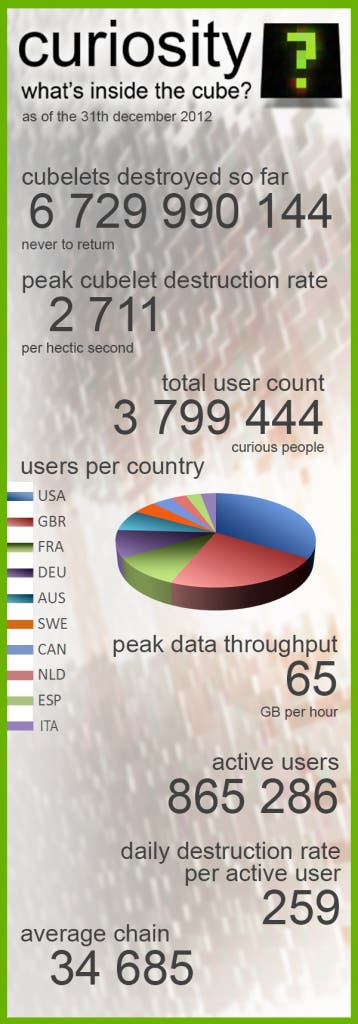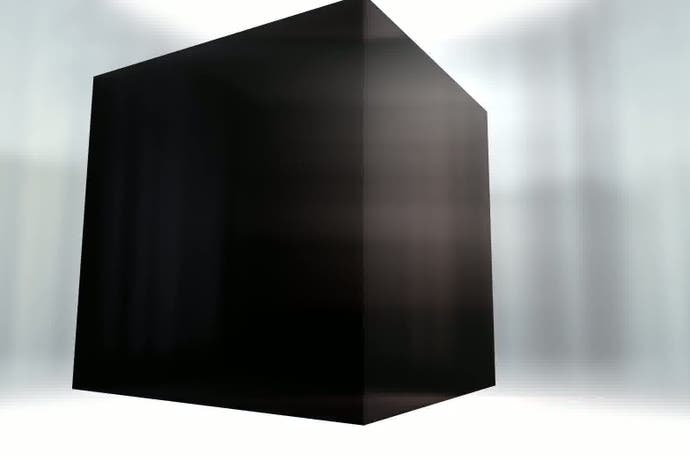Molyneux signals end to Curiosity - and we could find out what's inside the cube on the day of the next Xbox reveal
50 layers left. The race begins.

Peter Molyneux has signalled the end of the Curiosity experiment - and we could find out what's inside the cube on the day Microsoft announces the next Xbox.
There are 50 layers left, and Molyneux told Eurogamer that internal projections at Guildford-based studio 22cans suggest its virtual innards - which he has promised will change someone's life - could be discovered on 21st May.
That day is, of course, when Microsoft will hold its Redmond event to unveil its next-generation Xbox to the world.
"Tim [Rance, CTO] has done an analysis of probability and that's where the probability comes out," Molyneux told Eurogamer.
"It's just pure luck! I suppose the conjecture of there being something to do with the Xbox in the middle would be on everyone's minds...
"If I give any clues then the amazing fact that it hasn't leaked out - because I'm just such a blabber mouth - it would be such a shame if that was the case," he said.
Molyneux hit the headlines last month when 22cans updated the Curiosity app to include a tool to re-grow its cube via the purchase of chipped-away cubelets. You can buy blocks of cubelets in varying amounts for varying prices, and can also remove the same numbers of cubelets for the same amounts.
"You could, and this would be a weird, bizarre way of griefing," Molyneux pondered, "you could have Microsoft execs buying parts of the cube back again. That would be great."
If I give any clues then the amazing fact that it hasn't leaked out - because I'm just such a blabber mouth - it would be such a shame if that was the case
22cans boss Peter Molyneux
Curiosity released in November 2012 and has been running for nearly half a year. Molyneux said he wanted to bring the experiment to a close now because he felt it would be wrong for it to last any longer - and he wants the development team to concentrate fully on Godus.
"We felt people were just getting tired," he said. "People are forgetting that idea of what's in the middle and they're just going onto the cube to tap.
"I was slightly worried by people turning around and saying we're never going to get to the middle. You know, it's an impossible task.
"And the other thing is, I am desperate for someone to get to the middle. I'm just impatient for that to happen. It needs to happen. As I've always said it's an amazing thing that's in the middle, and I want the world to find out what that is."
What's inside the cube remains a mystery, although Molyneux hasn't been afraid to tout its impact. We know it's not money, a sports car, a dead cat or Half-Life 3, but it will "change your life forever".
He reckons that following today's announcement the experiment "moves on to this idea that people are racing". "They've now got a strong objective. As soon as you get through the 50 layers then the prize and the mystery at the middle will be discovered. We want to give away that prize."
22cans will do its utmost to make the cube's final layer as fair as possible. All that will be possible is "pure tapping", but you will be able to spend any coins you've acquired up to that point to help you out.
At the five layers remaining point, 22cans will go into "Cube Watch", meaning someone will be watching player progress 24 hours a day to spot any attempt at hacking the app to remove cubelets.
Then, when the cube is down to the last 10,000 cubelets, 22cans will monitor its Curiosity server, tracking the time of taps down to the millisecond so it can work out who triggers the end.
At this stage, Molyneux predicts a "cubelet hunt" will exist, where players struggle to find the final cubelet. "When there's just 10 on a surface and you're scrolling around to look for that final one, it will be a race to that final one," he said.
Before all that, 22cans will add features to add to the experience. A countdown timer will be switched on, and expect to see visualisation of how many cubelets have been destroyed so players get a sense of the cube getting smaller and smaller. And the layers themselves will contain numerology so you know how many are left.
When the final cubelet is tapped, the server will generate a list of all the people on the server and associated time stamps. 22cans will then verify the final tap was legal (Molyneux is worried about people creating bots that tap). Then it will send a message to the person who performed the final tap, which will trigger a change in Curiosity so everyone else in the world will see something different.
The person who destroys the final cubelet will receive a link to a video Molyneux has created (only three people in the world know what's inside the cube) explaining what's inside. What is inside isn't the video - it's what the video says it is, and "what their choices are and what is going to happen next", Molyneux said, cryptically.
...
22cans launched the Curiosity experiment in part to face a technical challenge it could learn from, but also to analyse how players interact with technology. All this, Molyneux said, will feed into Godus, the god game 22cans successfully crowd-funded through Kickstarter late last year.
It's amazing the mistakes we made, and we made those mistakes at the start of Curiosity. Bizarrely, those are the same sort of mistakes SimCity made when they released
"It's amazing the mistakes we made," Molyneux admits. "And we made those mistakes at the start of Curiosity. Bizarrely, those are the same sort of mistakes SimCity made when they released, which is you've got to have your infrastructure right. You've got to be able to scale up and scale down on a second by second basis, not release something and think, oh well, it's all going to be fine.
"A few months ago we had a lot of people hacking the Android version and attacking our servers. So we've learnt a hell of a lot from that. And that's been very useful to learn those lessons before we release Godus.
"It's more useful for us on the gameplay side and on the motivation side. What's been astounding is, even the most casual player will tap far far more than we ever dared hope they'd tap. Originally I thought the golden rule about gameplay design was you've got to give people these very short objective level things. You've got to give people a sense of story and a sense of progression - all those cornerstones of game designs that when you're designing a role-playing game or an RTS, you slavishly implement just because that's the way you did it before.
"Curiosity breaks a lot of those models. The objective is so ridiculously huge - you've got to get to the centre of the cube - it should be almost meaningless. It's like a memory you recall. And what you do is so insanely simple. It is just tapping. All you do is tap.
"What that says to us is the conventional rules of designing a game like this in this sort of formula have to change. Indeed the way we're balancing Godus, there's a lot of learning from Curiosity. Now don't think you're going to be tapping on the Godus world for thousands of hours. You're not. But there is a lot of deep learning."
Molyneux expects to release the alpha for Godus, which those who pledged the appropriate amount on Kickstarter will have access to, in the middle of May. This will provide our first glimpse of how there's a part of Curiosity in the god sim.
"Especially around the balance," he said, "and what you get and how you can seed in people's mind that there is a long objective I've got and then there's perhaps a shorter objective."
"That's been absolutely fascinating," he continued. "There's almost this need for people to be able to communicate through the gameplay. What was fascinating about Curiosity was how we gave people such an insanely simple and primitive way of communicating. That's why you only could communicate to other people by the way you tapped, by leaving messages or drawing pictures or rubbing out people's pictures, or starting something off and letting other people finish it. That, people found fascinating.
"We've got a huge library of images people have created and other people have destroyed and adapted and changed, and we're definitely taking some of that into Godus. Anybody can create something and being able to share that something with lots of people is absolutely fascinating.
"When we looked at Curiosity it was a fascinating tell into the way the new wave of people interact with technology."
...

Molyneux is never far from controversy, and he's often accused of over-promising and hyping his games. His latest divisive move came last month, when he, as already mentioned, updated the Curiosity app to include a tool to re-grow its cube via the purchase of chipped-away cubelets.
He was labelled a "troll" and was accused of money grabbing. "Remember this is an experiment," he countered to Eurogamer. "It's as much a psychological experiment as it is a technical experiment or an experiment with monetisation. And the psychology of adding cubes back is just to see what the world's reaction is to all that. That was part of the reason to do that.
"We didn't expect anybody really to buy into that, but there have been millions of cubes added back already and this hasn't really been kicked off. There have been many more millions of cubes removed, obviously, but there have been people who have spent money. And we set the price quite high. This isn't a trivial thing. It's an actual step forward.
"It's all part of this weird world we live in at the moment, where we are connected in a way and we can influence things even though we're individuals. People bandying together and doing things together is a fascinating part of the experiment."
The pay to add cubelets controversy wasn't Curiosity's first. Ahead of the app's release Molyneux defended the eccentric pricing for the DLC for Curiosity, which included a diamond chisel valued at $50,000.
As it turns out, 22cans was never allowed to sell the diamond chisel for that huge amount because of rules that limit the amount users can spend on the App Store. Instead, the developer allowed it to be purchased using Curiosity's in-game currency only - and set a ridiculously high purchase price (three billion in-game coins). Now, all the diamond chisels have been acquired, but through cheating rather than legitimate means. As you'd expect, they will be disabled for the cube's final layer.
"We also had a lot of problems with Apple especially trying to work out what Curiosity was," Molyneux recalls. "Was it an experiment? Was it a game? Was it a lottery? Was it a form of gambling?
"At one point they were saying this is gambling. You're going to have to go through all the gambling boards. And if you do that you have to have someone from the gaming board in your office watching you compile the final build, and that was out of the question."
The vast majority of cubelets have been destroyed through "legal" taps, Molyneux insisted. In total, Curiosity has been downloaded a whopping five million times, "and all you do is tap on this bloody cube," Molyneux said. "That's insane."
...
With Curiosity nearing its end, thoughts inevitably turn to Godus. There will be further experiments within Godus and, as it turns out, its alpha may launch around the time the cube expires.
Molyneux is thinking about a way of letting as many people access the alpha as possible, given the thousand or so who backed it to the tune of the tier that guaranteed access aren't enough to stress test some of Godus' bigger systems. An announcement on this will be made soon.
It's an amazing game already. I can say these things. They don't mean anything until you get a version in your hands and can see what I'm talking about, but it's already a totally unique game
And, in typically enthusiastic fashion, Molyneux predicted great things for his first post-Microsoft game.
"It's an amazing game already," he said. "I can say these things. They don't mean anything until you get a version in your hands and can see what I'm talking about, but it's already a totally unique game.
"There's nothing ever been like Godus. It's exactly what we said we'd do: we've been inspired by some of the things that were done in the early Populous and Dungeon Keeper and Black and White and even Fable and Curiosity, but mixing that inspiration together is something completely new and different. Different in every sense. It's a different feel of a game. And I can't wait for people to get their hands on it. It's very exciting.
"The only thing I'm slightly worried about is people expect the alpha to be a completely finished game. It's not. There are bits of it that are far better than any alpha I've seen before, and there are bits where you say, hang on a second, what about this? But what is there is really amazing."
As for Curiosity, Molyneux said he was open to the idea of someone other than 22cans taking control of the cube, restarting it and monetising it.
"It could be another way of running a lottery," he said. "You could say, there's £50,000 in the middle and the last person who taps gets the centre of the cube. It's kind of like gambling really, if you defined it like that."




